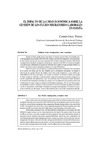Please use this identifier to cite or link to this item:
https://accedacris.ulpgc.es/jspui/handle/10553/57243
| DC Field | Value | Language |
|---|---|---|
| dc.contributor.author | Grau Pineda, María del Carmen | en_US |
| dc.date.accessioned | 2019-10-21T16:24:37Z | - |
| dc.date.available | 2019-10-21T16:24:37Z | - |
| dc.date.issued | 2011 | en_US |
| dc.identifier.issn | 0213-0750 | en_US |
| dc.identifier.other | Dialnet | - |
| dc.identifier.uri | https://accedacris.ulpgc.es/handle/10553/57243 | - |
| dc.description.abstract | España no habría podido tener el crecimiento económico que ha tenido sin la llegada masiva de inmigrantes en el período 2001-2008. No obstante, la política de inmigración se ha caracterizado hasta fechas recientes por una escasa ordenación de los flujos migratorios laborales. Más allá del contingente de trabajadores extranjeros establecido por primera vez en 1993, las iniciativas dirigidas a una gestión más ordenada de las migraciones laborales han ocupado un lugar secundario frente a los intentos por luchar contra la inmigración irregular y el control de fronteras. Frente a la actual crisis económica, la reducción directa de las expectativas de crecimiento de los puestos de trabajo que han sido atendidos por los trabajadores inmigrantes, ha exigido la adopción de dos grandes bloques de medidas, hasta cierto punto antagónicas, a cuyo análisis pretenden dedicarse las líneas que siguen: por un lado, los intentos, no siempre acertados, por regular los flujos migratorios laborales e institucionalizar canales de inmigración económica temporal con retornos organizados anticipadamente, lo que ha contribuido tanto a la firma de acuerdos bilaterales de contratación de trabajadores extranjeros en origen como a la preferencia por la gestión colectiva de contrataciones en origen, antiguo contingente de trabajadores extranjeros; de otro, en el lado opuesto, las facilidades al retorno voluntario se han reactivado a través de los distintos programas articulados a tal fin, el humanitario y el destinado a trabajadores extranjeros desempleados con derecho a la prestación contributiva por desempleo, si bien su efectividad ha sido y está siendo sumadamente reducida. | en_US |
| dc.description.abstract | Spain could not have the achieved economic growth that has without the help of the massive immigration arrived to the country from 2001-2008. Even that, the immigration policy has been charac-terized by a lack of labour immigration flows organisation. Besides foreign workers who arrived back in 1993, the initiatives that aim to have a more organised management of labour migration have been forgotten and efforts have been allocated to fight against illegal immigration and border control. In the context of economic crisis, the direct reduction of expectations to job increase, that were fulfilled by migrant workers, has two main trends that are the object of the present study. On one hand the efforts, not always successful, to regulate the labour migratory flows and institutionalize channels of temporal economic migration with returns organised beforehand, and that has even contributed to the reach bilateral agreements of providing foreign workers’ contracts in origin as the best option for collective management of contracts. And on the other side, and opposite, facilitate any volunteer return that are consi-dered through the different programs articulated to such end, humanitarian and to foreign unemployed that have the right of unemployment social benefits, even if its effectiveness has been reduced. | en_US |
| dc.language | spa | en_US |
| dc.relation.ispartof | Temas laborales: Revista andaluza de trabajo y bienestar social | en_US |
| dc.source | Temas laborales: Revista andaluza de trabajo y bienestar social [ISSN 0213-0750], n. 109, p. 73-110 | en_US |
| dc.subject | 560504 Derecho constitucional | en_US |
| dc.subject | 560507 Derecho público | en_US |
| dc.subject.other | Immigration | en_US |
| dc.subject.other | Economic crisis | en_US |
| dc.subject.other | Inmigración | en_US |
| dc.subject.other | Crisis económica | en_US |
| dc.title | El impacto de la crisis económica sobre la gestión de los flujos migratorios laborales en España | en_US |
| dc.type | info:eu-repo/semantics/article | en_US |
| dc.type | Article | en_US |
| dc.identifier.url | http://dialnet.unirioja.es/servlet/articulo?codigo=3644664 | - |
| dc.description.lastpage | 110 | en_US |
| dc.identifier.issue | 109 | - |
| dc.description.firstpage | 73 | en_US |
| dc.investigacion | Ciencias Sociales y Jurídicas | en_US |
| dc.type2 | Artículo | en_US |
| dc.contributor.authordialnetid | 186745 | - |
| dc.identifier.dialnet | 3644664ARTREV | - |
| dc.identifier.ulpgc | Sí | es |
| item.fulltext | Con texto completo | - |
| item.grantfulltext | open | - |
| crisitem.author.dept | GIR ECOAQUA: Turismo, ordenación del territorio y medio ambiente | - |
| crisitem.author.dept | IU de Investigación en Acuicultura Sostenible y Ec | - |
| crisitem.author.dept | Departamento de Derecho Público | - |
| crisitem.author.orcid | 0000-0003-0274-8875 | - |
| crisitem.author.parentorg | IU de Investigación en Acuicultura Sostenible y Ec | - |
| crisitem.author.fullName | Grau Pineda, María Del Carmen | - |
| Appears in Collections: | Artículos | |
Page view(s)
99
checked on Oct 12, 2024
Download(s)
122
checked on Oct 12, 2024
Google ScholarTM
Check
Share
Export metadata
Items in accedaCRIS are protected by copyright, with all rights reserved, unless otherwise indicated.
